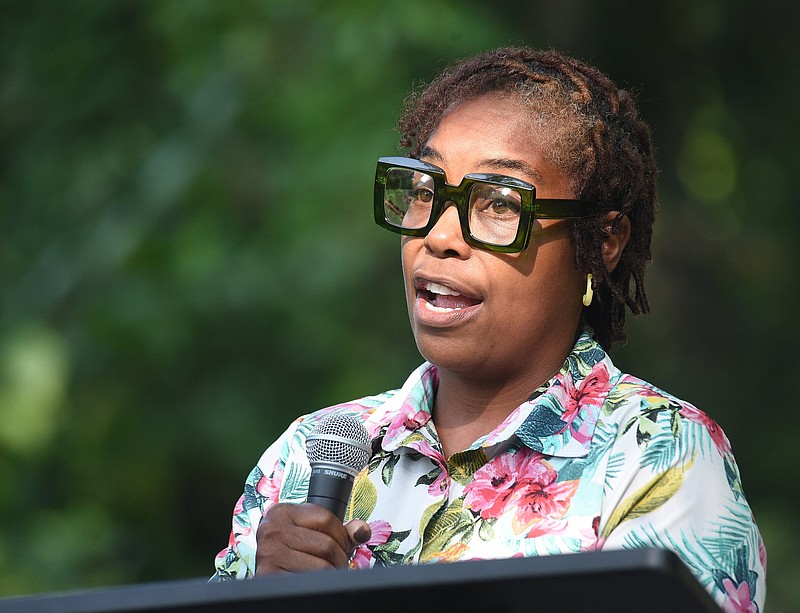A draft ordinance put forth by Chattanooga City Councilwoman Demetrus Coonrod, of Eastdale, this past week would move city elections to August, better aligning them with those held for federal and state offices, as well as establish term limits for members of the City Council.
Elections for mayor and City Council would occur on the first Tuesday in August, according to a copy of the proposed ordinance, and if no candidate receives a majority of the vote, a runoff would occur on the second Tuesday in November. Currently, city elections occur in March and runoffs in April.
As written, the ordinance would also establish a maximum of four consecutive four-year terms for council members, who don't currently serve under any limits.
With city elections now occurring several months after presidential elections, Coonrod argued that her proposal could help boost turnout by clamping down on voter fatigue and save the city money that could be used on other programming. Coonrod said elections would remain nonpartisan and could move to even years.
(READ MORE: Hamilton County saw 9% drop in early voting in advance of Thursday's upcoming election)
The city estimates the March 3, 2021, mayoral election cost about $224,487, the April 13, 2021, runoff election $188,741 and the April 1, 2017, special runoff election $31,223. Most of Chattanooga's special elections cost in the range of $25,000 to $35,000. The next regularly scheduled city election will occur in 2025.
"It just makes sense to move us onto a cycle to be with state representatives ... in August," Coonrod said by phone Friday. "In the county elections, the state elections and presidential elections, people come out based on the things that are important to them ... so more people are likely to come out to vote."
Term limits, Coonrod said, would also ensure voters could bring new voices and ideas onto the elected panel.
"It breaks up that monopoly by ending incumbent advantages and allowing new people the opportunity to run for office -- giving people a choice instead of the same incumbent running election after election after election," she said.
Hamilton County Election Administrator Scott Allen said in a phone call Friday that one hurdle for Coonrod's proposed change would be figuring out how to adjust current council terms, which end in 2025, so that they fall on the August ballot.
Overall, however, moving city elections to August so that they dovetail with regularly scheduled elections could save the city money, Allen said. All other municipalities in the county hold their elections in either August or November. The Hamilton County Election Commission runs city elections, providing poll workers and organizing early voting options, and the city then reimburses the commission for the cost.
(READ MORE: Hamilton County sees influx of records requests related to 2020 presidential election)
Allen said the adjustment could also help boost turnout.
"The city typically sees very low turnout in their standalone elections," Allen said, reiterating that voters tend to feel worn out once the presidential election is over.
Chris Acuff, an assistant professor of public administration at the University of Tennessee at Chattanooga, said in an email that advocates for changing the dates of municipal elections often cite low voter turnout as one of their justifications. However, turnout in August 2022 was about 20% while the most recent Chattanooga election in 2021 saw slightly higher participation of just under 25%, he said.
"Turnout often fluctuates based on a number of factors, but it isn't clear that turnout would be significantly higher in an August election compared to a competitive city election in March," he said.
The city would also still be required to pay the election commission for administering the city election.
"While the cost could certainly be less if conducted in conjunction with an August or November election," Acuff said, "we would certainly not recoup all of the current costs of conducting a city election."
In an email to fellow council members on Aug. 15, Councilwoman Jenny Hill, of North Chattanooga, said that while moving city elections to follow county and state cycles would save a small amount of money, the city would lose a lot more than it gains.
"County, state and national elections are partisan," she wrote. "As such, the rhetoric that surrounds those elections is largely party platform based -- aimed at moving primary voters (who typically fall on the ideological ends of the spectrum) to the polls. You'll notice that these elections struggle to focus on new ideas and solutions, favoring instead partisan lightning rods (most recently gun violence and indoctrination)."
(READ MORE: Hamilton County reports no problems with Dominion voting machines)
The city's elections create their own separate conversation "away from the noise of partisan blather," Hill wrote.
"Candidates are motivated to work just as diligently to earn votes -- and they have an opportunity to do so based on their ideas, record, relationships and work ethic -- rather than a binary (Republican or Democrat) proposition," she said.
Contact David Floyd at dfloyd@timesfreepress.com or 423-757-6249. Follow him on Twitter @flavid_doyd.
